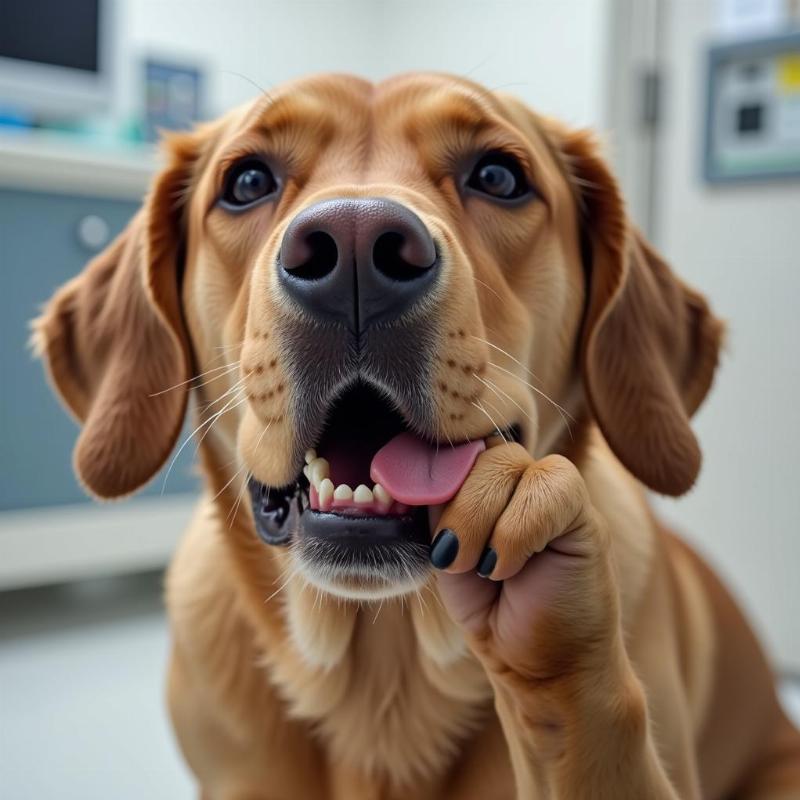Mouth pain can make your furry friend miserable, affecting their eating, drinking, and overall well-being. If you suspect your dog is experiencing mouth pain, it’s crucial to identify the cause and seek appropriate veterinary care. While you wait for your appointment, there are some things you can do to help ease your dog’s discomfort. This article will explore the potential causes of canine mouth pain and discuss safe and effective ways to manage it.
Pain in your dog’s mouth can stem from a variety of issues, from a simple teething puppy to more serious dental diseases. Recognizing the signs of mouth pain is the first step towards providing relief. Common symptoms include excessive drooling, pawing at the mouth, difficulty eating, reluctance to play with toys, and changes in behavior. If you notice any of these signs, it’s essential to consult a veterinarian.
Identifying the Source of Your Dog’s Mouth Pain
Pinpointing the exact cause of your dog’s mouth pain requires a professional examination. However, understanding the common culprits can help you prepare for your vet visit.
Common Causes of Canine Mouth Pain
- Periodontal Disease: This is the most common dental problem in dogs and is caused by the buildup of plaque and tartar. It can lead to gingivitis, gum recession, and even tooth loss.
- Abscessed Teeth: An infection at the root of a tooth can cause significant pain and swelling.
- Fractured Teeth: Chewing on hard objects can lead to chipped or broken teeth, exposing sensitive nerves.
- Oral Tumors: While less common, tumors in the mouth can cause pain and other symptoms.
- Foreign Objects: Sticks, bones, or other objects lodged in the mouth can cause pain and infection.
- Teething Puppies: Just like human babies, puppies experience discomfort while teething.
 Dog Experiencing Mouth Pain
Dog Experiencing Mouth Pain
Safe and Effective Pain Relief for Your Dog
Never give your dog human pain medications without consulting your veterinarian. Many over-the-counter pain relievers, such as ibuprofen and acetaminophen, are toxic to dogs and can cause serious health problems.
Veterinarian-Approved Options for Pain Relief
- Prescription Pain Medication: Your veterinarian can prescribe safe and effective pain medications specifically formulated for dogs.
- Anti-inflammatory Drugs: Non-steroidal anti-inflammatory drugs (NSAIDs) can help reduce inflammation and pain. Your vet will determine the appropriate dosage and type for your dog.
Home Remedies for Temporary Relief
While you should always consult your vet before administering any home remedies, some options may provide temporary relief:
- Cold Compress: Applying a cold compress to the outside of your dog’s cheek can help reduce swelling and numb the area.
- Soft Food: Switching to a soft food diet can make it easier for your dog to eat while their mouth is sore.
- Dental Chews: Certain dental chews can help soothe teething puppies.
Preventing Mouth Pain in Dogs
Maintaining good oral hygiene is crucial for preventing mouth pain in dogs.
Essential Tips for Canine Oral Health
- Regular Brushing: Brush your dog’s teeth daily with a veterinarian-approved toothpaste.
- Dental Treats and Chews: Provide dental treats and chews designed to remove plaque and tartar.
- Regular Veterinary Dental Checkups: Schedule professional dental cleanings as recommended by your veterinarian.
Conclusion
Mouth pain in dogs can be distressing for both the pet and the owner. By understanding the causes, symptoms, and treatment options, you can help your furry friend feel better. Remember to always consult your veterinarian for diagnosis and treatment recommendations. Addressing mouth pain promptly and practicing good oral hygiene can contribute significantly to your dog’s overall health and happiness.
FAQ
- What are the signs of mouth pain in dogs? Excessive drooling, pawing at the mouth, difficulty eating, and changes in behavior can all indicate mouth pain.
- Can I give my dog human pain medication? No, never give your dog human pain medication without consulting your veterinarian. Many are toxic to dogs.
- How can I prevent mouth pain in my dog? Regular brushing, dental treats, and veterinary checkups are essential for preventing dental problems.
- What should I do if I think my dog has a fractured tooth? Contact your veterinarian immediately.
- What are some home remedies for temporary pain relief? A cold compress or switching to a soft food diet may provide some temporary comfort.
- How often should I brush my dog’s teeth? Ideally, you should brush your dog’s teeth daily.
- What kind of toothpaste should I use for my dog? Always use a toothpaste specifically formulated for dogs.
cbd oil for dogs at petco
are pork shoulder bones safe for dogs
smoked marrow bones for dogs
dog mouth bleeding after tooth extraction
dog grooming in lowell ma
Beautdogs.us is your premier resource for comprehensive dog care information, breed insights, and expert advice. We’re dedicated to providing both new and experienced dog owners with the knowledge they need to ensure their furry companions live long, healthy, and happy lives. Whether you’re looking for guidance on dog breeds, grooming tips, or health advice, Beautdogs.us is your trusted source. Contact us today for personalized support at [email protected] or +1 501-555-7529.